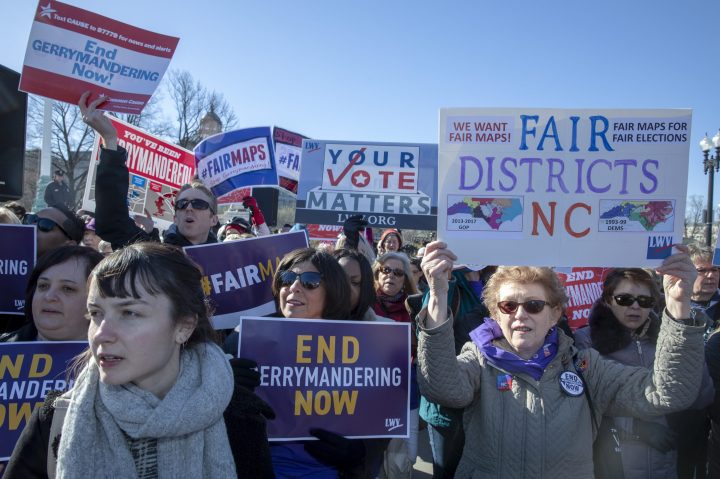
Gerrymandering is about economics too

For the month of September, Econ Extra Credit is watching “Slay the Dragon,” which is available to stream on Hulu with a subscription and Kanopy for free for many public library card holders and students. It can also be rented or bought on many platforms.
There are economic consequences for a lack of competition
Gerrymandering has obvious political effects, but it can also have economic consequences. One 2018 study found that partisan redistricting impacts people’s ability to borrow money. The less competitive a district was, the less access to credit a person living in that district would have.
“Elected officials, they have the ear of local businesses, including lenders,” said Rawley Heimer, the study’s co-author and an associate professor of finance at Arizona State University. “So lenders, therefore, have incentive to make decisions that benefit those politicians, including by increasing credit supply.”
“When a politician is insulated from political competition because of redistricting, lenders have less motivation to prioritize services to constituents,” he said.
(Listen to the full interview on marketplace.org)
While redrawing the maps can help to create more competitive districts, gerrymandering is not the sole culprit for the lack of competitive elections. One of the other major influences: voters are sorting themselves, moving to areas where their neighbors’ political views more closely align with their own. Even when the worst partisan gerrymandering is curtailed, it could still be difficult to draw competitive districts that are also compact and keep communities intact.
FiveThirtyEight created an interactive map in 2018 that allows you to test how different priorities impact the shape of political districts and the number of competitive seats. It’s worth checking out.
Your thoughts on gerrymandering
We asked for your thoughts on gerrymandering this month, and several of you responded with reflections and recommendations.
Some of you described how gerrymandering in your area has discouraged more moderate candidates from running for elections.
John C., who retired to a rural area in Texas wrote: “I am absolutely certain that Republican primary voters (many of whom live in rural Texas) do not represent a majority of the populace in Texas (most of whom live in urban/suburban Texas) but gerrymandering of legislative and congressional seats gives them the power to do whatever the hell they want!”
Lynn D. from Tennessee wrote that gerrymandering has “wrecked the opportunity for people who live in Nashville to have a voice and govern our city.” In 2022, new Republican-drawn maps divided the progressive leaning city into three separate congressional districts that are likely to be won by conservative candidates.
Doris M. recommended this Washington Post article about how Texas Republicans successfully carved Austin, the state’s most progressive city, into six congressional districts.
In response to David Brancaccio’s musings on ranked-choice voting as a possible fix for the ills of gerrymandering, Jean K. from Vancouver, Washington, wrote that county officials told her ranked choice was too “complicated” when she proposed using it for local elections. Her friends and neighbors also don’t understand how it would work.
“I’ve mentioned ranked choice to several people, and I think most of them have either not heard of it or are a bit confused,” she said.
Bruce F. in Utah wrote: “Ranked choice voting has been an ongoing debate in Utah politics for well over a decade. Supporters are very enthusiastic and are trying to educate the party on how it works and positive attributes. The general electorate does not understand it and would react poorly to it. My personal opinion is I like ranked choice voting for Primary Elections to shrink the field. When it comes to the general election, I think there should be one vote per person.”
There’s a lot happening in the world. Through it all, Marketplace is here for you.
You rely on Marketplace to break down the world’s events and tell you how it affects you in a fact-based, approachable way. We rely on your financial support to keep making that possible.
Your donation today powers the independent journalism that you rely on. For just $5/month, you can help sustain Marketplace so we can keep reporting on the things that matter to you.












